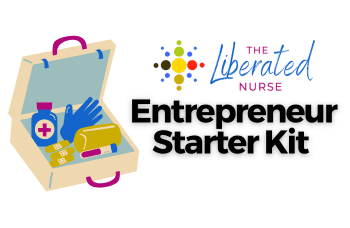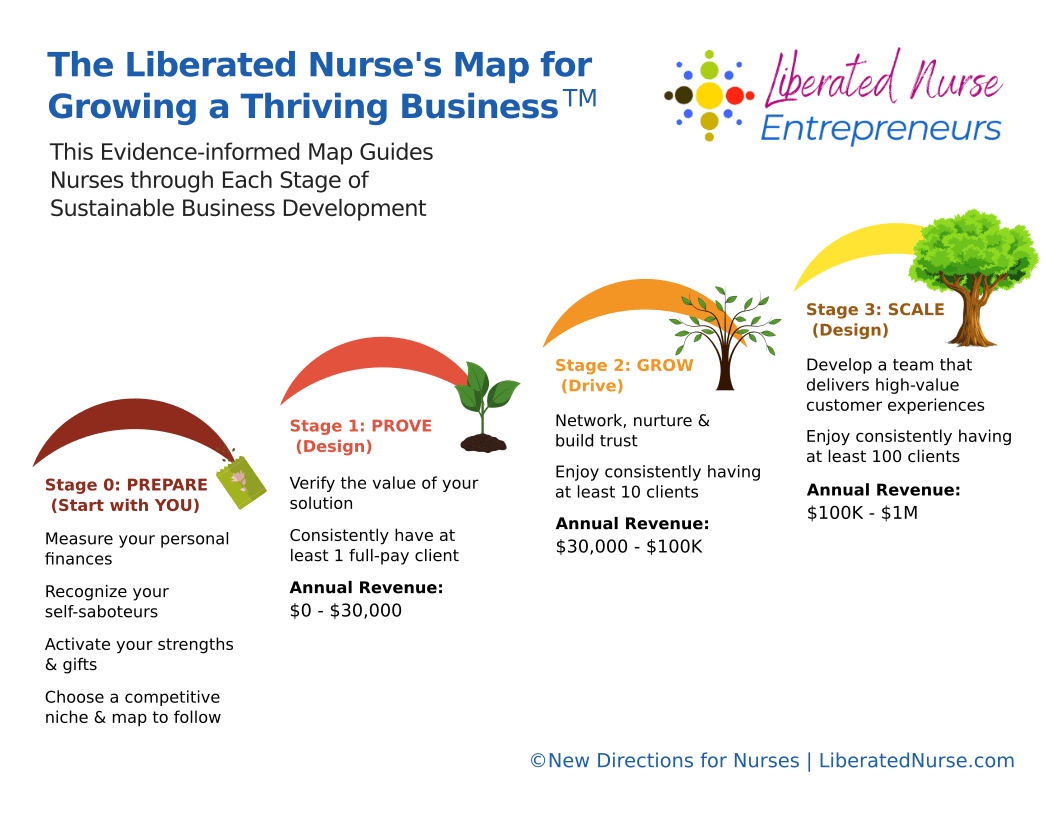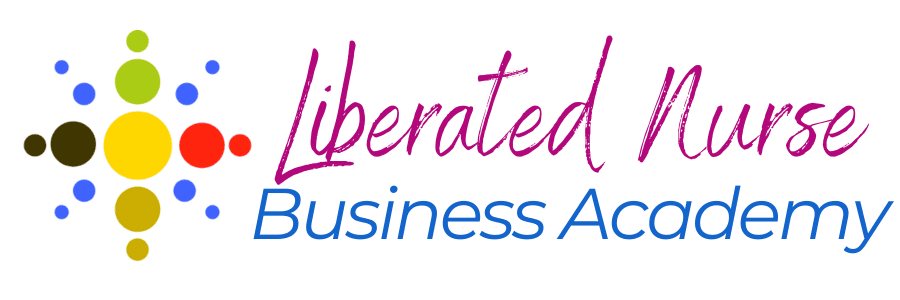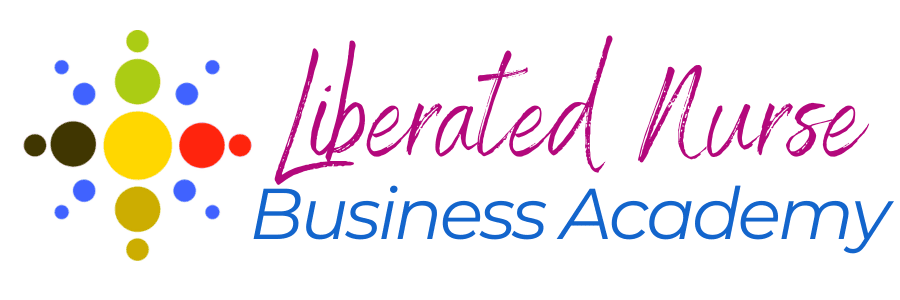The Holistic Nurse Business Development Process
by Sharon Burch, MSN, APRN, PHCNS-BC, APHN-BC, HWNC-BC

What Is Entrepreneurial Nursing?
| Hospitals; state, local, and private | 60% |
| Ambulatory healthcare services | 18% |
| Nursing and residential care facilities | 6% |
| Government | 6% |
| Educational services; state, local, and private | 3% |
| Other (including nurse entrepreneurs) | 7% |
Challenges and Opportunities for Nurse Entrepreneurs
Risks During Start-up
- Running out of money: Lack of clarity on how much net revenue is occurring and how to manage cashflow fluctuations
- Inexperience managing a business: An unwillingness to delegate, a faulty business model, or a poorly visualized business plan
- Unsuccessful marketing initiatives: Poor return on time and money invested, leading to #1
Internal and External Challenges
Jakobsen, et al.1 explored the experiences and perspectives of nine Danish nurse entrepreneurs. They found they faced many internal and external conflicts that compromised their ability to engage in empowered entrepreneurship. The results were organized into four themes:
Prejudice against entrepreneurship
Becoming an entrepreneur in a nursing culture
Rebellion against the conventional role of an employee
Challenging professional identity and forming new professional roles
Requires a significant learning process that develops nurses’ abilities to think outside the box
Has the potential to significantly develop the nursing role and identity and contribute to solving health challenges that require new approaches
Vannucci’s study6 aimed to understand the experiences and challenges of 44 nurse entrepreneurs who reported on their:
Transitions from employment to entrepreneurship
Key motivators in the decision to start a business
Challenges as entrepreneurs in the healthcare field
The study found that psychological empowerment factors were more motivating than financial gain or organizational constraints. The top psychological empowerment factors were
Meaning / purpose
Having an impact
Need for growth
Making decisions
The participants reported higher rates of self-care practices than a norm community sample, and while some work/life balance challenges were identified, the biggest challenges were identified as implementing a marketing strategy, networking, and accessing mentorship.
Ethical concerns also contribute to inner conflicts nurses experience. A recent study of 11 nurse entrepreneurs found they were particularly concerned with ensuring their ventures do no harm.7 My experience talking with hundreds of nurse entrepreneurs confirms that fear of harming people often deters them. These findings point to the need for educational pathways through which nurses can develop business skills aligned with nursing’s moral and ethical values.
Opportunities
According to the American Holistic Nurse Credentialing Corporation (AHNCC), holistic nursing aims to heal the whole person, grounded in the inherent interconnectedness of self, others, nature, and spirituality. Holistic nurses are instruments of healing and facilitators in the healing process, honoring the patient/client’s subjective experience of health, health beliefs, and values and viewing the whole person and his/her needs in their entirety, with integration as the goal8.
Emerging from holistic nursing, holistic nurse entrepreneurship offers enormous potential to contribute to holistic solutions and elevate the nursing profession’s role, power, and identity. I would love to see BSN nursing programs introduce foundational concepts of entrepreneurial nursing and develop that knowledge base in advanced-level programs.
My Point of View
I’ve learned from more than 40 years as an entrepreneur that small business development follows a fairly predictable process with specific developmental milestones to be met in each stage.
The Holistic Nurse Business Development Process™
When nurses learn to use this process, they feel more satisfied with their careers and become more empowered contributors to solving the holistic problems that individuals, groups, communities, and environments face.
To actualize their potential, entrepreneurial holistic nurses need evidence-informed holistic business education and mentoring designed by nurses. For example, most conventional marketing and sales education involves some level of pressure or manipulation to get someone to say yes - even much of what is called heart-centered, conscious marketing education.
I believe we don't have to choose between ethics and effectiveness. We don't have to get good at 'pitching' or do things that feel like we're selling our souls. In fact, we can let go of 'going for the sale' entirely.
What can we do instead? We can acknowledge the truth of whether or not our offer is a fit between us and the one thinking of buying. However, we need at least three things:
An evidence-based framework and map to guide our decisions
A toolset that fits our values, and
Insightful feedback to help us develop our skills
If we don’t have all three of these things, we’ll take the long and exhausting road to success, and too many of us will fail.
In the Liberated Nurse Entrepreneur programs at New Directions for Nurses, we teach marketing based on informed consent. This means we facilitate a caring, ethical, and conscience-led win-win for ourselves and the people we serve in every marketing and sales activity.
The Holistic Nurse Business Development Process™
The Holistic Nurse Business Development Process (HNBDP) helps nurse entrepreneurs succeed in their businesses by developing their holistic perspective, challenging and expanding the nursing culture and roles, and gaining confidence in evidence-informed business experimentation and value analysis.
The HNBDP involves translating conventional business processes into the Holistic Caring Process. Nurses
Receive tools for identifying their business stage of development and creating a marketing plan based on that stage
Practice applying these tools to their business with feedback from an experienced nurse entrepreneur mentor, and
Leave with a refreshed mindset and refined skills so they can thrive as whole persons and succeed at serving more individuals, groups, and communities
See the image below. The PREPARE Stage assesses one's energetic, emotional, physical, financial, and relational resources and identifies one's entrepreneurial energy type. The next Stage (PROVE) confirms the feasibility and profitability of one’s ideas.

From the summer of 2020 to the spring of 2021, I tested the HNBDP with a pilot group of seven nurse entrepreneurs. The results showed that the HNBDP helped nurses discover new levels of creativity, self-expression, and vitality that supported growing a thriving business. As a result, the HNBDP is now being offered as a holistic 60-hour continuing nursing education (CNE) program.
One of the program’s participants recently said, “The application of the nursing process to business development helped me see how to apply my nursing skills and knowledge to my business. It is helping me build confidence that, as a nurse, I have what it takes to be an entrepreneur. Learning about the stages of business growth has helped me see the path forward, and starting at the appropriate stage is helping me build a more solid foundation.”
Conclusion
In conclusion, entrepreneurial nursing represents significant potential for growth and development in individuals, contributing innovative solutions to health problems and disparities and empowering the nursing profession.
It is time for nurses, including those in academic, administrative, and leadership positions, to embrace the challenges and opportunities in the entrepreneurial process and empower themselves and their colleagues to put nurse entrepreneurship into action.
Learn about free and paid business development workshops, webinars, and coaching services for nurses, including our Liberated Nurse Entrepreneur Starter Kit.
References
Jakobsen, L., Wacher Qvistgaard, L., Trettin B., Juel Rothmann, M. (2021). Entrepreneurship and nurse entrepreneurs lead the way to the development of nurses’ role and professional identity in clinical practice: A qualitative study. Journal of Advanced Nursing: Leading Global Nursing Research, 77(10), 4142-4155. https://doi.org/10.1111/jan.14950
BLS.gov. “Occupational Outlook Handbook: Registered Nurses” https://www.bls.gov/ooh/healthcare/registered-nurses.htm#tab-3 (Retrieved December 31, 2022.)
Podlesni, M. Private email communication with the author on December 31, 2022.
Neergård, G.-B. (2021). Entrepreneurial nurses in the literature: A systematic literature review. Journal of Nursing Management, 29(5), 905-915. https://doi.org/10.1111/jonm.13210
Horton, M. (2022). The 4 Most Common Reasons a Small Business Fails. Investopedia.com https://www.investopedia.com/articles/personal-finance/120815/4-most-common-reasons-small-business-fails.asp (Retrieved on December 30, 2022.)
Vannucci MJ, Weinstein SM. The nurse entrepreneur: empowerment needs, challenges, and self-care practices. Nursing: Research and Reviews. 2017;7:57-66 https://doi.org/10.2147/NRR.S98407
Neergård, G.-B. (2022). Nurse entrepreneurs’ ethical concerns: A qualitative inquiry of the pursuit of opportunity. Journal of Nursing Management, 30(7), 2346–2356. https://doi.org/10.1111/jonm.13850
AHNCC BOARD OF DIRECTORS. (2013). A Position Statement on the APRN Consensus Model, Submitted to The National Council of State Boards of Nursing. American Holistic Nurses Credentialing Corporation.
About Sharon Burch
Sharon Burch, MSN, APRN, PHCNS-BC, APHN-BC, HWNC-BC, is an expert in holistic nursing practice, continuing nursing education, and nurse business development. She has studied business in-depth, translated business practices into nursing practices, and lived the experience of a nurse entrepreneur since 1984. Sharon served as AHNA's Holistic Nurse Practice Specialist from 2016 - 2019. During that time, she was instrumental in producing and promoting the Integrative Healing Arts Program and AHNA’s holistic regional self-care conferences. Today, Sharon provides business development education, coaching, and mentoring to nurse entrepreneurs through her business, New Directions for Nurses.
Reach her at sharon@liberatednurse.com
Read more about Sharon's Nurse Entrepreneur story here.
*This article was originally published in Beginnings magazine and is reprinted here with permission from the American Holistic Nurses Association.
Recommended From the Liberated Nurse Blog
Learn what nurses should know about starting and growing a business, plus register for free access to business coaching with Sharon.


